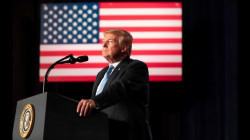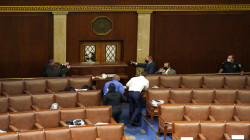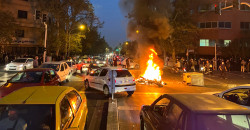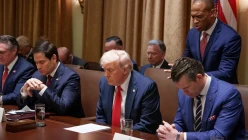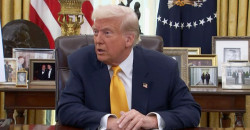US Supreme Court justices grill Trump lawyer over ballot disqualification
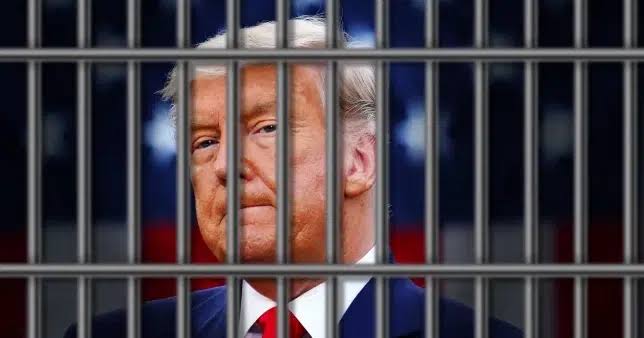
Shafaq News/ U.S. Supreme Court justices on Thursday peppered a lawyer for Donald Trump with questions as the former president fights to avoid being kicked off state presidential ballots for his actions involving the 2021 Capitol attack in a case with major implications for the November election.
The nine justices were hearing Trump's appeal of a Dec. 19 ruling by Colorado's top court to disqualify him from the state's Republican primary ballot under the U.S. Constitution's 14th Amendment after finding that he participated in an insurrection.
The justices focused most of their time early in the argument on two main arguments made by Trump's lawyers, that Section 3 cannot be enforced by states absent congressional legislation and that presidents are not subject to Section 3.
Section 3 of the 14th Amendment bars from holding public office any "officer of the United States" who took an oath "to support the Constitution of the United States" and then "engaged in insurrection or rebellion against the same, or given aid or comfort to the enemies thereof."
The justices grilled Trump's lawyer Jonathan Mitchell at the outset of the arguments.
Conservative Chief Justice John Roberts asked Mitchell whether a state's top elections official could disqualify a candidate who comes forward and says he took the oath mentioned in the provision and engaged in an insurrection.
"No, the secretary of state could not do that," Mitchell said.
"So if the state banned even an admitted insurrectionist from the ballot, it would be adding to and altering the Constitution's qualifications for office," Mitchell added.
"If the candidate is an admitted insurrectionist, Section 3 still allows the candidate to run for office and even win election to office - and then see whether Congress lifts that disability after the election," Mitchell said.
The House of Representatives or Senate, if the candidate is running for Congress, would then have to decide on its own "whether to seat that elected insurrectionist because each house is the sole judge of the qualifications of its members."
Questioned by liberal Justice Ketanji Brown Jackson, Mitchell also argued Trump is not subject to the disqualification language because a president is not an "officer of the United States." Mitchell said such an officer would only be an appointed official of some kind.
Trump's lawyers also have argued the provision cannot be enforced by courts absent congressional legislation and that he did not engage in an insurrection.
"The consequences of what the Colorado Supreme Court did, some people claim, would be quite severe," said conservative Justice Samuel Alito. "The decision of the Colorado Supreme Court could effectively decide this question for many other states, perhaps all other states."
Trump did not attend. A source familiar with his plans said Trump would travel from his home in Florida to Nevada, which on Thursday night holds a nominating caucus that Trump is expected to win handily as he cruises towards his party's nomination to challenge Democratic President Joe Biden on Nov. 5.
In an interview on Thursday morning with a conservative radio show host, Trump said allies of President Joe Biden were trying to use the Colorado case to take him out of the presidential contest.
"They want to have the Supreme Court rule or vote to take me out of the race. That would be a very terrible thing to do," Trump said. "It's about the vote. It's about our Constitution."
Anti-Trump forces have sought to disqualify him in more than two dozen other states - a mostly unsuccessful effort - over his actions relating to the Jan. 6, 2021, Capitol attack. Maine also has barred him from its ballot, a decision put on hold pending the Supreme Court's ruling in the Colorado case.
Colorado's Republican primary is scheduled for March 5.
DEMONSTRATORS GATHER
Dozens of demonstrators gathered outside the white marble courthouse on a sunny and chilly winter morning. Some held signs reading, "Failed Coup," "Remove Trump" and "Trump is a Traitor." Police set up barricades around the courthouse for security.
The case calls on the Supreme Court to play a central role in a presidential contest unlike any since its landmark Bush v. Gore decision that handed Republican George W. Bush the presidency over Democrat Al Gore in 2000.
The plaintiffs who sued seeking to disqualify Trump are four Republican voters and two unaffiliated voters.
The Supreme Court's 6-3 conservative majority includes three justices appointed by Trump.
The 14th Amendment was ratified following the American Civil War of 1861-1865 in which seceding Southern states that allowed the practice of slavery rebelled against the U.S. government.
Trump supporters attacked police and swarmed the Capitol in a bid to prevent Congress from certifying Biden's victory. Trump gave an incendiary speech to supporters beforehand, telling them to go to the Capitol and "fight like hell." He then for hours rebuffed requests that he urge the mob to stop.
The plaintiffs have said a president clearly is an "officer of the United States" because "it would make no sense to read Section 3 as disqualifying all oath-breaking insurrectionists except the one holding the highest office in the land."
The plaintiffs in the Colorado case are backed by Citizens for Responsibility and Ethics in Washington, a liberal watchdog group.
(Reuters)
